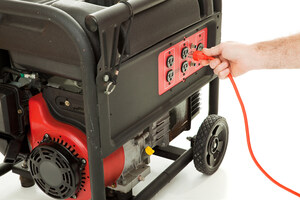Before The Storm Hits: Get Ready For A Safer Clean-Up Before A Hurricane Or Severe Weather Strikes
OPEI Offers Tips During National Safety Month to Help Homeowners & Businesses Prepare
ALEXANDRIA, Va., June 9, 2014 /PRNewswire/ -- Far too often, people face grave safety threats after a hurricane or severe weather ends when they begin to clean-up their homes and businesses. It's important for homeowners and businesses to have proper equipment on hand and to be familiar with safe operating procedures when an emergency hits.
During National Safety Month in June, the Outdoor Power Equipment Institute (OPEI), an international trade association representing small engine, utility vehicle and outdoor power equipment manufacturers and suppliers, encourages homeowners and businesses to take stock of their power tools and equipment for storm clean-up, such as chainsaws, pruners, generators, and utility type vehicles.
OPEI's President and CEO Kris Kiser says it's important to think ahead about equipment you may need because, "Often after a disaster there is a rush on power equipment like generators and chainsaws – just like there's a rush on supplies at the grocery store. Having the proper equipment on hand before the post-storm rush means you avoid being left empty-handed."
The trade association also cautions consumers to know how to handle that equipment safely. Kiser says before a storm strikes is the best time to familiarize yourself with your power equipment operation and safety manuals. "When you're in the throes of an emergency, you might not be thinking clearly or you may have trouble locating your safety manuals," said Kiser. "So it's important to brush up on the user and safety guidelines before disaster strikes."
Here are a few tips to help:
Use common sense with chainsaws. Remaining calm and using common sense are important when using chainsaws to clear storm debris. Be aware of fundamental dangers that can occur with chainsaws, including kickback, which may happen when the moving chain at the tip of the guide bar touches an object, or when the wood closes in and pinches the saw chain in the cut. This can cause the saw to suddenly jerk back toward the operator.
Always stand with your weight on both feet, and adjust your stance so you are angled away from the saw chain blade. Also, hold the chainsaw with both hands, and never overreach or cut above shoulder height.
Keep firm footing when using pole saws and pole pruners. Pole saws or pruners are effective in selectively removing dead or damaged limbs. When operating these tools, make sure you always keep a firm footing on the ground. Observe the safety zone, which means keeping bystanders and power lines (those above you and any that might have fallen down) at least 50 feet away from your work area.
Give portable electric generators plenty of ventilation. Generators produce carbon monoxide, an odorless, colorless and poisonous gas. Generators should never be used in an enclosed area, even if the windows or doors are open. The muffler on a generator can get extremely hot, so any combustible materials (leaves, grass, brush) must be cleared away before operating. Remember to clean out any stale fuel by draining old fuel out of the tank and the carburetor bowl to avoid engine problems, such as starting issues and rough running.
Drive Utility Type Vehicles (UTVs) with care. UTVs can be useful for hauling debris, particularly when clearing damage in rural settings or on large properties. When the vehicle is loaded, the center of gravity is higher, and so is the risk of overturning. To keep the vehicle stable, drive slowly and do not turn the vehicle in mid-slope or hill as this could increase the likelihood of overturning.
Have the proper fuel on hand for your outdoor power equipment. It's also important to have the proper fuel on hand for your equipment, as filling stations may be closed after a storm. Make sure you store fuel properly and buy the type of fuel recommended by your equipment's manufacturer. It is illegal to use any fuel with more than 10% ethanol content in outdoor power equipment (for more information on fueling properly see www.LookBeforeYouPump.com).
Find your safety gear now. Before the storm is also a good time to locate any safety gear you may need for storm cleanup. Sturdy shoes, safety goggles, hard hats, reflective clothing and work gloves may be helpful and in short supply after a storm.
In addition to the equipment-specific safety tips listed above, it's also important for equipment owners to keep up with regular equipment maintenance and tune-ups, as recommended by the manufacturer. For more safety tips for outdoor power equipment visit http://www.opei.org/education/safety/tips-/.
About OPEI
The Outdoor Power Equipment Institute (OPEI) is an international trade association representing 100 small engine, utility vehicle and outdoor power equipment manufacturers and suppliers of consumer and commercial outdoor power equipment. The OPEI Education Foundation is the creative force behind TurfMutt.com. OPEI is a recognized Standards Development Organization for the American National Standards Institute (ANSI) and active internationally through the International Standards Organization (ISO) in the development of safety and performance standards. OPEI is managing partner of GIE+EXPO, the industry's annual industry tradeshow. For more information, visit www.OPEI.org.
Media Contact: Outdoor Power Equipment Institute, Ami Neiberger-Miller, Four Leaf PR, 703-887-4877, [email protected]
Photo - http://photos.prnewswire.com/prnh/20140607/95852
SOURCE Outdoor Power Equipment Institute
WANT YOUR COMPANY'S NEWS FEATURED ON PRNEWSWIRE.COM?
Newsrooms &
Influencers
Digital Media
Outlets
Journalists
Opted In





Share this article